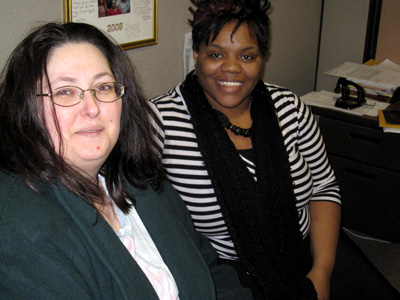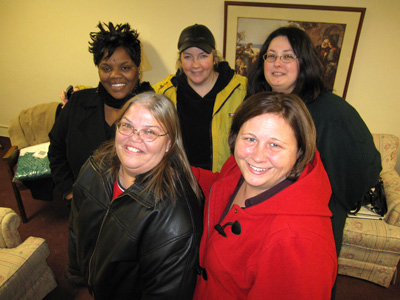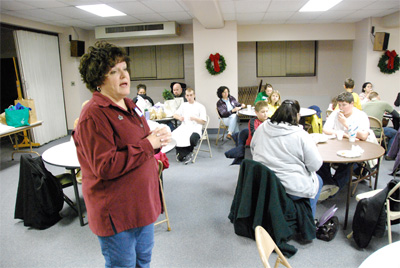Writing a New Chapter

Angelic Wood (l) at the office of Teamwork for Quality Living with Dorica Young, her case manager.
Photo by Laurie Stern
When Angelic Wood's unemployment compensation ran out last winter, she sought help in high places. Wood wrote a letter to the mayor of Muncie. She also wrote to the governor.
"My phone is shut off, my TV service is shut off and I am so behind on my house payment I will have to put off [paying] utilities so I don't lose my house like I lost my vehicle," she wrote.
She also feared losing her children, Jayson, 13 and Tristan, 9.
Angelic Wood belongs to what may become known as the "brittle class." She's lost economic ground from her middle-class upbringing. "A lot of people who have never been in poverty have no clue what it's like," she says.
Wood's story is not unusual for Muncie. Her parents had steady factory jobs with benefits, so she grew up with middle-class advantages. Wood went to a business college after high school but dropped out to start a family. Her marriage didn't last. She made ends meet with child support and by working part-time jobs. Her prospects darkened in 2002, when she was diagnosed with fibromyalgia, a chronic disorder characterized by muscle pain and fatigue. She was a clerk at a software company, but she began missing a lot of work. She lost her job in 2007.
"There are days when I can barely get out of bed," she wrote in her letter to the mayor.
She collected unemployment benefits, enrolled in a vocational education program and qualified for food stamps, as well as government assistance with her medical and utility bills. Still, last winter she was desperate, and angry.
"Something needs to be done," she wrote. "I really wish I could afford to move away from here."
Wood says her outlook changed when the mayor's office responded to her letter. The city referred her to a local nonprofit organization called Teamwork for Quality Living, or TQL. The group believes a community should lift people out of poverty one at a time. It pursues that goal with middle and upper-income volunteers who mentor people in poverty, like Wood.

Back row l-r, Dorica Young, Wendy Mock, Angelic Wood. Front row Jackie Garrett and Carrie Summers. Young and Summers taught the "Getting Ahead" class for Teamwork for Quality Living.
Photo by Laurie Stern
"We don't help them manage the poverty they're in," says executive director Molly Flodder. "We help them set goals and move out of poverty."
Muncie is one of 40 communities nationwide that uses this model. Organizers recruit volunteers to become long-term mentors for people in poverty. They group into teams called "circles."
Like many organizations, TQL has its own language and structure. The person trying to get out of poverty is called the "leader." The more affluent partners of the circle are called "allies." A circle consists of a leader and three or four allies. The leader sets both the short and long-term goals, charting a path to a better life. TQL staff members know how to connect leaders to government services like subsidized day care or scholarships to local colleges. They also provide a link to community resources like food pantries. But advocates say the real success of the circles depends on the quality of the relationships between leaders and allies. "What we're doing is helping people create intentional friendships across class lines," Flodder says.
In any community, a person's personal and professional success often depends on informal social networks. The allies are not allowed to give their leaders cash or other financial assistance. Instead, they're encouraged to give them access to their social and professional connections. The minimum commitment to a circle is 18 months. "We move slowly because we take people all the way to the finish line," Flodder says.
Allies go through intense training that includes a poverty simulation. They are given a new identity that includes insufficient income, children to support, needy family members, and circumstantial setbacks (a car breaks down, someone gets sick, the landlord is abusive). Many allies call this simulation eye-opening, and some say it changed their lives and made fixing poverty a personal imperative.
Flodder says TQL finds allies through religious congregations and community groups; but sometimes allies find her. Muncie has a proud history of volunteerism. "Everyone wants a safe community, a clean community, a place where people have opportunities," Flodder says. TQL offers a concrete way for concerned residents to make a difference.
Last December, TQL threw a Christmas party at the First Baptist Church in downtown Muncie. The whole community was invited. But it was icy and cold; a lot of people stayed home. Angelic Wood made it though.

Molly Flodder is executive director of Teamwork for Quality Living, an anti-poverty group that holds bi-monthly dinners at First Baptist Church in Muncie.
Photo by Laurie Stern
From an ample kitchen in the church basement, volunteers served barbeque, beans and coleslaw. Others brought grocery sacks of donated gifts and a pile of Christmas wrap. That way, people who couldn't afford to shop still had gifts to give their loved ones.
The families ate at large round tables, changing places frequently as they visited with each other. Wood brought her sons, Jayson and Tristan. All three heaped their plates with barbeque. Angelic held court at her table after dinner while Jayson went to bake cookies with a volunteer and Tristan wrapped presents with another. At the end of the evening, he gave his mother a heart-shaped glass candy dish.
Wood's circumstances have already improved. TQL helped her find an old van in good condition through a vehicle donation program. Food stamps helped put meals on the table, and a county public assistance program kept the lights on. The state vocational education program helped her find a job she could do from home. She takes orders for tax forms over the Internet. The hours are flexible; she averages 15-20 per week. After his mom signs off from work, Tristan takes over the computer desk to do his math homework.
"We're still poor but we have our house," Tristan says optimistically. Wood pulls on a long, green wool coat she got at the clothing exchange table at the Christmas party. She's headed to another TQL meeting.
Wood has been so inspired by TQL, she wrote another letter to the government in February. This time she went to the top. She wanted President Barack Obama to know about the program.
"This program brings hope when you think all hope is lost, self-esteem when you have been beaten down by everyone else, and friendships that will last a lifetime," she wrote. "I now have more hope and determination than ever and I owe that to the community of people that reach out to others in their time of need."
In February, Angelic met with her allies for the first time. One of her goals is to improve her writing, and possibly build a career around it.
Despite their mother's financial challenges, Tristan and Jayson get A's in school. College may be in their future, a traditional stepping stone out of poverty. Jayson is in eighth, on track to be a Twenty-First Century Scholar, an Indiana program that pays college tuition for top students from low-income families.
Tristan is in third grade. Math and science are his favorite subjects. He might be an astronaut when he grows up. But, then, he might be a massage therapist. Tristan rubs his mom's back and feet when she's worn out. He's happy to do it. "Because she does buy our food and if it wasn't for her we wouldn't be living right now," he says.
Back to Hard Times in Middletown.

